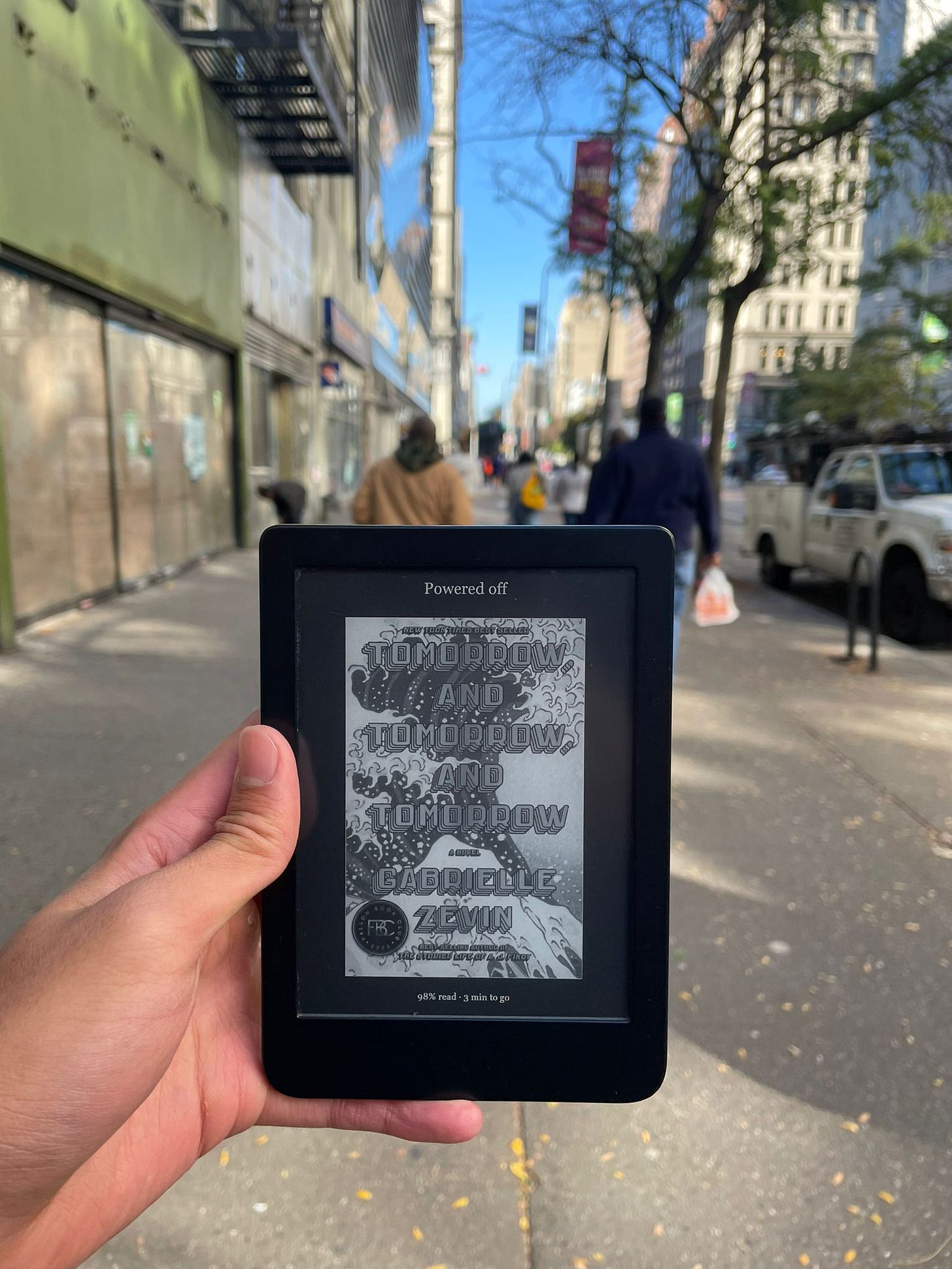Stats
Date Read: 28 Sep - 13 Oct
Pages: 401
Format Read: NLB E-book
Genres: Contemporary, Romance
My Rating(out of 5): 5 Stars
Quotes
“What is a game?" Marx said. "It's tomorrow, and tomorrow, and tomorrow. It's the possibility of infinite rebirth, infinite redemption. The idea that if you keep playing, you could win. No loss is permanent, because nothing is permanent, ever.”
We are all living, at most, half of a life, she thought. There was the life you lived, which consisted of the choices you made. And then, there was the other life, the one that was the things you hadn't chosen.
To allow yourself to play with another person is no small risk. It means allowing yourself to be open, to be exposed, to be hurt. It is the human equivalent of the dog rolling on its back---I know you won't hurt me, even though you can. It is the dog putting its mouth around your hand and never biting down. To play requires trust and love. Many years later, as Sam would controversially say in an interview with the gaming website Kotaku, "There is no more intimate act than play, even sex." The internet responded: no one who had had good sex would ever say that, and there must be something seriously wrong with Sam.
Review
Tomorrow, Tomorrow and Tomorrow feels like the real-world counterpart of Free Guy and Ready Player One (admittedly, these are the only two other books/movies I’ve read/watched about video games). Instead of the main characters being the gamers and their characters in the game, here, the protagonists, Sam and Sadie, are on the other side — they’re game designers.
Originally childhood friends, Sam and Sadie had drifted apart over the years. But with Sam in Harvard and Sadie in MIT, they reconnect while in college and reignite their shared love for video games by deciding to make a game together. The game they eventually decide to make, Ichigo, becomes far more complex and takes far longer to complete than either of them expected. But eventually, it seems to be worth it all — even dropping out of college for a semester, because Ichigo becomes a multi-million dollar hit.
This success gives them the encouragement to start their own game company straight out of college. We follow their exploits over the next 20 years and beyond as they churn out more games, and on the surface, it seems as if they have everything one could ask for; they become unimaginably successful, rich, and famous off creating video games, something they love. Who wouldn’t want that? But even with all their wildest dreams fulfilled, they still feel unhappiness, heartbreak, and anger, most of it stemming from how they still never can figure out how to communicate with each other after thirty years.
I loved how this novel was nerdy without being too nerdy. Of course, being a book primarily about video game development, it went into pretty great detail on what the games were about and what their gameplay was like. There was even exposition on the early programming languages they used. Though I’m neither a big gamer nor coder, I could still generally follow the mechanics of the games and Sam and Sadie’s work, because it was mostly elaborated on in layman’s terms. In fact, I rather appreciated the details and game/computing references. It gave the book greater quirkiness, and also made the games and their development process feel more real.
Furthermore, I didn’t expect a novel about video games to tug on my heartstrings so much. I felt it was more emotional than it was nerdy, particularly because of how it delved deeply into the characters’ backstories and relationships. Both Sadie and Sam are flawed, egoistical and unreasonable at times, and that makes us feel frustrated at how they act (or fail to), but also makes them more relatable. Despite their imperfect behavior, we see their backstories and things from their perspectives, we learn their internal monologue and see that they’re trying, and that makes us root for them and feel even more vexed when they argue and have misunderstandings. I so badly wanted Sam and Sadie to figure things out and make them work, because they are brilliant together and share such a deep connection, but everything was just so complicated — which is relatable too. Of course, there’s Marx too, Sam’s roommate who is basically the perfect human being. I loved him, and that one scene where he imagines himself in a video game is so powerful and evocative.
On that point, I also loved how video game scenes were used to resemble and symbolize real life as well as convey messages. This gave the lengthy depictions of the games a deeper meaning than just the (beautiful) imagery itself. And the video game worlds were indeed beautifully portrayed — the writing definitely painted a vivid, unique picture of each game that I could easily imagine and see in my head.
I’m not sure why, but I somehow get the feeling that the books I’m reading are all converging into one. When I saw Sam’s troubles with his legs and difficulties communicating, I was instantly reminded of Jude in A Little Life. This is either a sign that I’m becoming more well-read, or a sign for me to expand my scope of reading.
But I do love novels about everyday lives and events, and Tomorrow, Tomorrow, and Tomorrow definitely solidifies my love for the contemporary genre with its poignant, heartbreaking, and yet funny story involving video games — which are undoubtedly a quintessential part of our world today.




